[unable to retrieve full-text content]
15 Best GL Manga With Official English Translations GameRantWednesday, July 31, 2024
Tuesday, July 30, 2024
Commercial real estate decoded: Stocks in Translation - Yahoo Finance - Translation
[unable to retrieve full-text content]
Commercial real estate decoded: Stocks in Translation Yahoo FinanceWhy the West created a new dictionary for Israel and Palestine - Middle East Eye - Dictionary
[unable to retrieve full-text content]
Why the West created a new dictionary for Israel and Palestine Middle East EyeElden Ring update boosts Spirit Ashes, but missing translation staff yet to be added - Eurogamer - Translation
[unable to retrieve full-text content]
Elden Ring update boosts Spirit Ashes, but missing translation staff yet to be added EurogamerMonday, July 29, 2024
'The ick' and 'boop' among new terms added to Cambridge Dictionary - Sky News - Dictionary
[unable to retrieve full-text content]
'The ick' and 'boop' among new terms added to Cambridge Dictionary Sky NewsBetter cancer trial representation begins with speaking one's language - Medical Xpress - Translation
[unable to retrieve full-text content]
Better cancer trial representation begins with speaking one's language Medical XpressToda Natsuko: Legendary subtitler looks back on 50 years of films - NHK WORLD - Translation
[unable to retrieve full-text content]
Toda Natsuko: Legendary subtitler looks back on 50 years of films NHK WORLDSunday, July 28, 2024
Gen Z slang terms are part of the newest additions to the Cambridge Dictionary (can you guess their meanings?) - The Indian Express - Dictionary
[unable to retrieve full-text content]
Gen Z slang terms are part of the newest additions to the Cambridge Dictionary (can you guess their meanings?) The Indian ExpressTop 5 reasons to invest in ETFs: Stocks in Translation - Yahoo Finance - Translation
[unable to retrieve full-text content]
Top 5 reasons to invest in ETFs: Stocks in Translation Yahoo Finance‘The ick’, ‘boop’ and ‘chef’s kiss’ added to Cambridge Dictionary - The Guardian - Dictionary
[unable to retrieve full-text content]
New Hampshire DMV adds new handheld translation devices - WMUR Manchester - Translation
[unable to retrieve full-text content]
New Hampshire DMV adds new handheld translation devices WMUR ManchesterSaturday, July 27, 2024
"PvP", "Speedrun", And More Added To The Cambridge Dictionary - TheGamer - Dictionary
[unable to retrieve full-text content]
"PvP", "Speedrun", And More Added To The Cambridge Dictionary TheGamerFriday, July 26, 2024
Olympics Opening Ceremony Review: Paris’ Lengthy Spectacle On The Seine Lost In Translation On The Small Screen - Deadline - Translation
[unable to retrieve full-text content]
Olympics Opening Ceremony Review: Paris’ Lengthy Spectacle On The Seine Lost In Translation On The Small Screen DeadlineDo you know what ick, boop and chef’s kiss mean, words added to the Cambridge dictionary? - Firstpost - Dictionary
[unable to retrieve full-text content]
Do you know what ick, boop and chef’s kiss mean, words added to the Cambridge dictionary? FirstpostThursday, July 25, 2024
Passion and Endurance: How Videogame Fan Translations Get Made - Paste Magazine - Translation
[unable to retrieve full-text content]
Passion and Endurance: How Videogame Fan Translations Get Made Paste MagazineAn online evidence-based dictionary of common adverse events of antidepressants: a new tool to empower patients and clinicians in their shared decision-making process - BMC Psychiatry - Dictionary
[unable to retrieve full-text content]
An online evidence-based dictionary of common adverse events of antidepressants: a new tool to empower patients and clinicians in their shared decision-making process BMC PsychiatryWednesday, July 24, 2024
Five Ways Language AI Has Gone Mainstream - Slator - Translation
[unable to retrieve full-text content]
Five Ways Language AI Has Gone Mainstream Slator‘The First Descendant’ Translation Error Turns A Buff Into A Nerf For Valby’s Farm - Forbes - Translation
[unable to retrieve full-text content]
‘The First Descendant’ Translation Error Turns A Buff Into A Nerf For Valby’s Farm ForbesThe Wienermobile Wrecked, The Dictionary Is Blocking People, Horses Biting Tourists & Arm Wrestling With Fish - Outkick - Dictionary
[unable to retrieve full-text content]
The Wienermobile Wrecked, The Dictionary Is Blocking People, Horses Biting Tourists & Arm Wrestling With Fish OutkickTuesday, July 23, 2024
Europe's AI-powered Google Translate rival DeepL launches traditional Chinese language in Asia push - CNBC - Translation
[unable to retrieve full-text content]
Europe's AI-powered Google Translate rival DeepL launches traditional Chinese language in Asia push CNBCOpinion | Have a Foreign Language Love Affair This Summer - The New York Times - Translation
[unable to retrieve full-text content]
Opinion | Have a Foreign Language Love Affair This Summer The New York TimesNot Lost In Translation: How Barbarian Books Laid the Foundation for Japan's Industrial Revoluton - Marginal Revolution - Translation
[unable to retrieve full-text content]
Not Lost In Translation: How Barbarian Books Laid the Foundation for Japan's Industrial Revoluton Marginal RevolutionMonday, July 22, 2024
Japanese manga industry turns to AI in anti-piracy fight - NHK WORLD - Translation
[unable to retrieve full-text content]
Japanese manga industry turns to AI in anti-piracy fight NHK WORLDWhatsApp About To Launch New Android Feature To Translate Chats. ¡Estupendo! - Forbes - Translation
[unable to retrieve full-text content]
WhatsApp About To Launch New Android Feature To Translate Chats. ¡Estupendo! ForbesNew AI Translation Tool Outperforms ChatGPT & Google Translate - Tech.co - Translation
[unable to retrieve full-text content]
New AI Translation Tool Outperforms ChatGPT & Google Translate Tech.coThe Witcher's '90s comics are getting an English translation more than 30 years after they were first published - Gamesradar - Translation
[unable to retrieve full-text content]
The Witcher's '90s comics are getting an English translation more than 30 years after they were first published GamesradarSunday, July 21, 2024
Error caused by Facebook’s ‘auto-translation’, RTM clarifies - Free Malaysia Today - Translation
[unable to retrieve full-text content]
Error caused by Facebook’s ‘auto-translation’, RTM clarifies Free Malaysia TodayOpinion | Have a Foreign Language Love Affair This Summer - The New York Times - Translation
[unable to retrieve full-text content]
Opinion | Have a Foreign Language Love Affair This Summer The New York TimesSaturday, July 20, 2024
Time and Time Again - The Drift Magazine - Translation
[unable to retrieve full-text content]
Time and Time Again The Drift MagazineFive Works of Korean SFF in Translation - Reactor - Translation
[unable to retrieve full-text content]
Five Works of Korean SFF in Translation ReactorFriday, July 19, 2024
New AI Translation Tool Outperforms ChatGPT & Google Translate - Tech.co - Translation
[unable to retrieve full-text content]
New AI Translation Tool Outperforms ChatGPT & Google Translate Tech.coThursday, July 18, 2024
How To Add And Delete Words In Your iPhone Dictionary - SlashGear - Dictionary
[unable to retrieve full-text content]
How To Add And Delete Words In Your iPhone Dictionary SlashGearJD Vance's Last Name Means 'Bedbug' in Yiddish? - Snopes.com - Dictionary
[unable to retrieve full-text content]
JD Vance's Last Name Means 'Bedbug' in Yiddish? Snopes.comKeywords launches AI-powered FAQ translation tool it says will reduce costs by 100 percent - Game Developer - Translation
[unable to retrieve full-text content]
Keywords launches AI-powered FAQ translation tool it says will reduce costs by 100 percent Game DeveloperWhatsApp to soon allow users to automatically translate messages - The Times of India - Translation
[unable to retrieve full-text content]
WhatsApp to soon allow users to automatically translate messages The Times of IndiaTuesday, July 16, 2024
Samsung's Live Translate feature is expanding support to these messaging apps - Android Authority - Translation
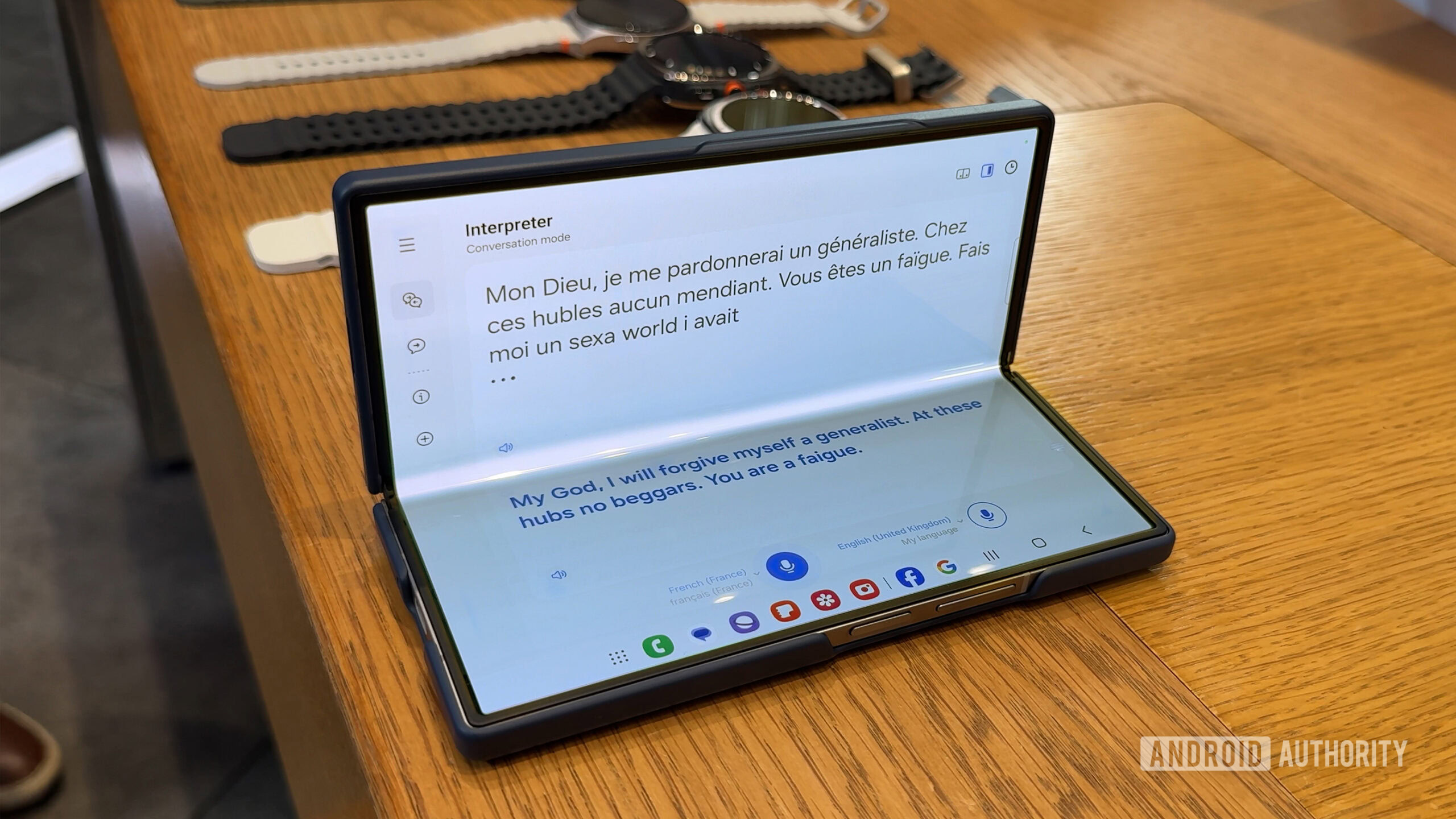
Alex Walker-Todd / Android Authority
TL;DR
- Samsung’s Live Translate feature will work with 9 third-party messaging apps in One UI 6.1.1.
- The feature was first introduced in One UI 6.1 where it only worked with phone calls through the Samsung Dialer app.
- Live Translate provides real-time, two-way translations during voice calls, supporting 16 different languages.
Translation services like Google Translate have made it dramatically easier to communicate with people who speak other languages, but there’s still a lot of room for improvement, especially in the area of real-time interpretation. For example, although Google Translate can help you hold a two-way, in-person spoken conversation with someone else, it can’t act as an interpreter during phone calls. That’s something that Samsung’s Live Translate feature offers, though. With the forthcoming One UI 6.1.1 update, Live Translate will not only translate speech during regular phone calls but also during voice calls in several popular third-party messaging apps.
Live Translate debuted on the Samsung Galaxy S24 series earlier this year. It’s a One UI 6.1 feature that acts as a real-time, two-way interpreter during phone calls. During phone calls, Live Translate can be activated by pulling down the Quick Settings panel and tapping on the Live Translate button. Once activated, a dialog is shown that displays the words from both sides as they’re being spoken, transcribed, and subsequently translated. It’s a neat feature, albeit one with limited use since it only worked with regular phone calls.
During last week’s Galaxy Unpacked event, though, Samsung confirmed that Live Translate is being enhanced to support a variety of third-party messaging apps. Although they didn’t share what messaging apps will be supported during the keynote, they listed the supported apps in a press release on their Korean blog.
According to Samsung, Live Translate will work with the following nine messaging apps: KakaoTalk, Line, WeChat, WhatsApp, Telegram, Facebook, Messenger, Instagram DM, Signal, and Google Meet.
These apps are used by billions of people worldwide, so supporting them makes a lot of sense.
The inclusion of Signal might raise some eyebrows, but there shouldn’t be any concern since the Live Translate feature uses local language packs to translate speech on-device. In fact, Live Translate uses the same language packs that other language-related Galaxy AI features rely on. That means the feature will work with 16 languages by the end of this month, as announced by Samsung at last week’s Unpacked.
At launch, Galaxy AI offered support for 13 different languages, including Chinese (Mandarin), English (India, UK, US), French, German, Hindi, Italian, Japanese, Korean, Polish, Portuguese, Spanish (Mexico, Spain, US), Thai, and Vietnamese. In April, Samsung announced that they were expanding support for 3 new languages (Arabic, Indonesian, and Russian) and 3 new dialects (Australian English, Cantonese, and Canadian French). They also said that later this year, support for Romanian, Turkish, Dutch, Swedish, traditional Chinese, and European Portuguese would be coming.
Interpreter is another Galaxy AI feature that’ll benefit heavily from expanded language pack support. It’s basically Samsung’s version of Google Translate’s conversation mode. It’s accessed through a dedicated Quick Settings tile and supports relaying translated audio to the Galaxy Buds when paired. With the One UI 6.1.1 update, the Interpreter feature also added dual-screen support, allowing both screens of the Galaxy Z Flip 6 to show translated speech.

15%off
Samsung Galaxy Z Flip 6
Compact design
Foldable display
Improved battery
Thanks to Reddit user FragmentedChicken for the tip and screenshots!
You might like
Mitsubishi redefines ‘gender-laden’ word for Michaelis dictionary - Digital Journal - Dictionary

After decades of war, motorists are taking advantage of newfound security to pit their souped-up cars against each other in races, or show off drifting skills - Copyright AFP/File Daniel LEAL
Michaelis dictionary has redefined the meaning of the word “pilota”, in a move intended to help to empower women. This change was ‘driven’ by Mitsubishi, an initiative triggered by the motor giant’s base of operations in Brazil. This historic initiative has redefined the feminine noun and, and the same time, strengthens women’s presence in motorsports.
Mitsubishi Motors carried out a transformative action beyond the racetracks. In an impactful campaign, the brand managed to change the meaning of the word ‘pilota’ in the Michaelis dictionary.
Campaign
In Brazil, masculine words end with the vowel O, while feminine words end with the vowel A. Previously, ‘pilota’ was associated with “defeat” and “loss.” Now, ‘pilota’ is a symbol of leadership and female empowerment. This initiative mobilized thousands on social media, reinforcing the importance of gender equality.
The campaign, created by the Tech & Soul agency, was widely publicized on social media, receiving massive support. The hashtag #NovaPilota went viral, showing that society is ready to embrace gender equality and inclusion. This digital mobilization not only promoted the campaign but also brought to light the discussion about the importance of revising and updating word meanings to reflect a fairer society.
Change in meaning
Now, ‘pilota’ refers to women who drive vehicles in automotive competitions, pilot aircraft or boats, and lead in various fields. This change is not just semantic but represents a significant advancement in the fight for gender equality in motorsports.
The change in the meaning of ‘pilota’ could be just the beginning of a larger movement to ensure that women have the same opportunities and recognition as men in the sport.
Significance of the change
The change in the Michaelis dictionary is more than a symbolic victory; it is a recognition of the importance of representation. When words reflect reality in a fair and equal manner, they help shape perceptions and inspire social change. By redefining ‘pilota,’ Mitsubishi Motors highlights the competence and value of women who challenge stigmas in a traditionally male-dominated environment.
Michaelis is a brand of dictionaries of the Portuguese language published in Brazil by Melhoramentos.
The redefinition of ‘pilota’ by the Michaelis dictionary has a profound impact on Brazilian motorsports. The sport, long dominated by men, is now making more room for women to showcase their talent and competence. By promoting this change, Mitsubishi Motors is helping to create a more inclusive and welcoming environment for all motorsport enthusiasts, regardless of gender.
Why Mitsubishi? Mitsubishi Motors is a supporter of female participation in Brazilian motorsports. The brand promotes the inclusion of women in various roles within racing teams. The 2024 season of the Mitsubishi Cup, the largest cross-country speed rally in the country, features an all-female team, showcasing the brand’s commitment to diversity.
The Dictionary of Canadian Biography’s Robert L. Fraser shines a light on a generation of Canadian athletes that paved the way - Faculty of Arts & Science - Dictionary
As the world looks forward to the Paris 2024 Olympics, the Dictionary of Canadian Biography’s manager Robert L. Fraser is peering into Canada’s athletic past.
Now in its 65th year, the Dictionary of Canadian Biography (DCB) contains more than 9,000 biographies of ordinary and famous Canadians. The bilingual resource, a joint effort by the University of Toronto and l’Université Laval, is the only one of its kind in Canada.
While hundreds of athletes will don the maple leaf at this summer’s Olympic games, it’s a far cry from a century ago when just a handful of Canadians crossed the Atlantic to compete in international competitions.
Fraser spoke to Arts & Science News about three relatively unknown Canadians whose stories still hold up a century later.
Velma Springstead (Track and Field)

Velma Springstead was a member of the first Canadian women’s team to compete in international competition.
“Springstead is a name I’ve known my whole life,” says Fraser. “She's an interesting figure because she's a Hamiltonian, as am I, and I first heard about her when I was a kid from my dad. He saw her compete and spoke highly of her and her abilities as an athlete.
“It was important for him that a woman received the prominence she did based on her skills, hard work and discipline. She was working class, a secretary and, as Bruce Kidd wrote for the DCB, ‘an early favourite for a berth’ on the 1928 Canadian women’s Olympic team that went to Amsterdam. She died in 1927 from pneumonia before she could compete, but she was a big part of the breakthrough of women into sport.”

Photo: Bettmann/Getty Images.
Édouard Fabre (Marathon)

“One of the important things about Édouard Fabre is the Iroquois tie,” says Fraser.
Fabre, who was French-Canadian, was raised by an Iroquois family, the Montours, who lived across the street.
“Fabre qualified for the 1912 Stockholm Olympic Games, along with another Canadian James Duffy, finishing in 11th place, and later won the Boston Marathon.
“This biography comes from our Laval office. One of the things that distinguishes the DCB from other national biographical dictionaries is that our biographies are based on primary sources — these can be documents or interviews, and we give elaborate instructions to potential contributors. The primary source for this biography is Fabre’s daughter, Marcelle, who gave an interview in 2008.”
Edward (Ned) Hanlan (Rower)

“Ned Hanlan was the first Canadian sports superstar. What's fascinating about him, I think, is that you see in the late 19th century, with the growth of Canadian society, the rise of a popular sports figure who attracts people from all classes and ethnicities. He embodies youthfulness, strength and skill. He’s an international figure and an ad person's dream of what an athlete should look like,” says Fraser.
“He represents the first major example of sports entering the marketplace, and the beginnings of something recreational becoming part of mass society with the spread of newspapers and photography. It's the beginning of that path to the popularity and proliferation of sports within society at large.
“What makes team sports and the Olympics possible is the ability to get from one place to another. In Hanlan’s era you couldn't do that very easily, but by the time you get to the 1920s, you can. Upon retiring in 1897, he continued coaching at the University of Toronto.”
A century-old dictionary can answer questions you didn’t know you had - NNY360 - Dictionary

A century-old dictionary can answer questions you didn’t know you had
MINNEAPOLIS -- Do you own a dictionary anymore?
Monday, July 15, 2024
Why Do We Say “Crickets” When It’s Silent? - Mentalfloss - Dictionary
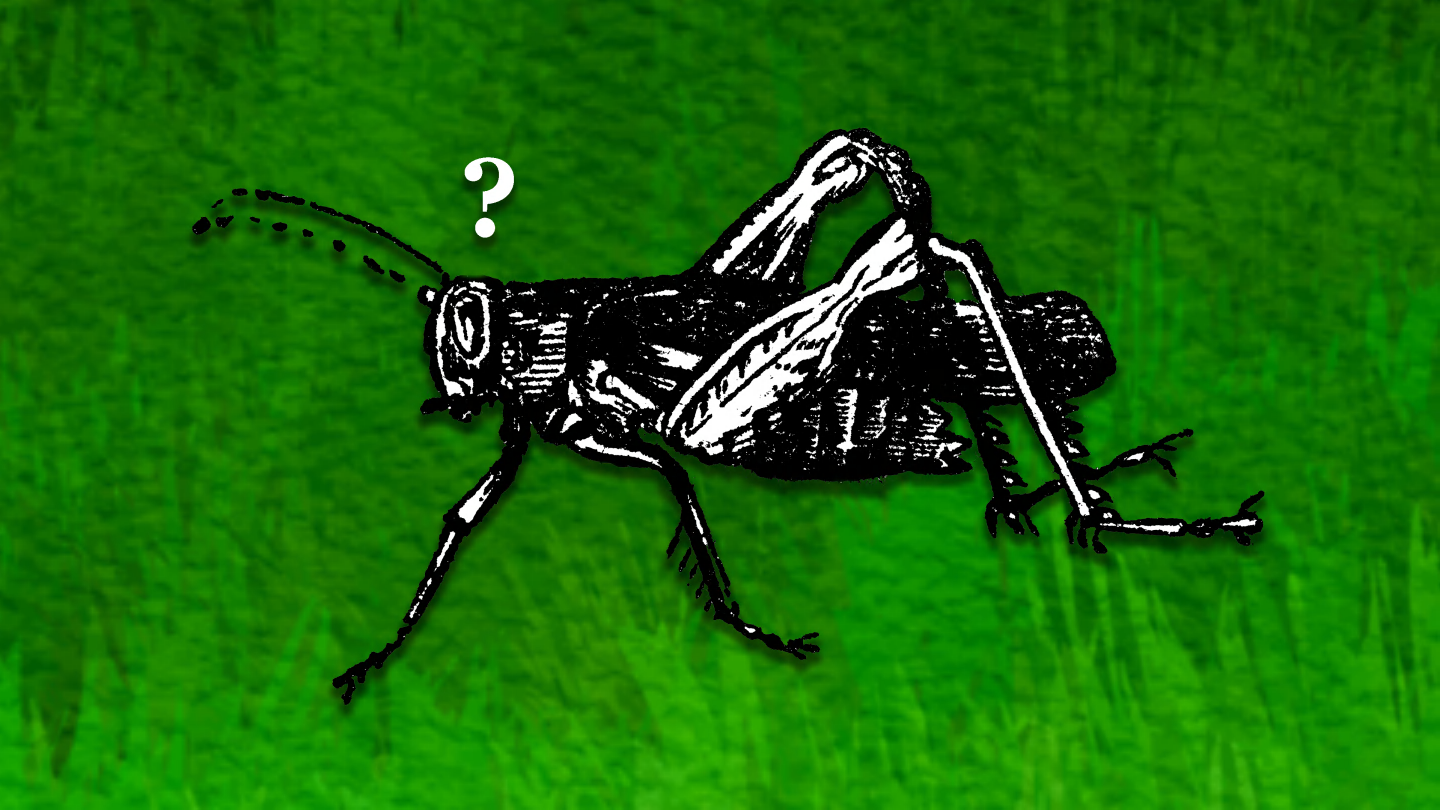
What are the sounds of silence? With all due respect to Simon and Garfunkel, the most common answer is “crickets.” This noisy insect has somehow become synonymous with no sound at all.
This sense of the word crickets has yet to make the Oxford English Dictionary (though it surely will eventually). Still, it has plentiful coverage in Merriam-Webster, which added it to the dictionary in September 2023 with the definition “a conspicuous lack of response.” In discussing the term in a “Words We’re Watching” feature—which cites examples going back to the early 2000s—Merriam-Webster describes how crickets originally conveyed a sense of a rural setting:
“Crickets are often used by writers to convey atmosphere or to create a sense of place. That is, not the insects themselves, but rather the sound that crickets make. The chirping of crickets is the sound of nature on a summer night, and it has become a kind of cultural shorthand that indicates much with a single word: the setting is far from the city and far from people.”
The term seems to have evolved from senses indicating a rural setting—which is less noisy than the city by a lot—to any place or stretch of time quiet enough that, in theory, only the sound of crickets could be heard, as in this example from the 2007 novel Agnes and the Hitman: “There was a silence long enough to hear crickets in, and Agnes thought, If he makes some crack about me being not little, I’m gonna hit him again, and then he spoke.”
From there, crickets became a term for silence itself, one clear enough that it can stand alone as its own sentence, functioning as a sound(less) effect in writing. (Movies may have played a role in this: As Merriam-Webster notes, screenwriters have used it as “cinematic shorthand for quiet country locations” in scripts.)
Green’s Dictionary of Slang surprisingly has no examples until 2024, when it records a post on the social media platform Bluesky about a double standard in political coverage: “If Biden had called his wife Jill ‘Joan,’ how much ink would we see about how he’s old, senile + losing it? Yet The Other Guy ... crickets.”
This is typical of how the term is used. When a standup comedian’s joke bombs? Crickets. When a teacher baffles students? Crickets. When a band plays an unknown song instead of one of your favorites? Crickets. Crickets are the patron animal of silent awkwardness, a total non-reaction.
Crickets is a bit of a paradoxical term, as it means or indicates silence, but literally refers to some pretty noisy creatures. According to some sources, crickets can chirp as loudly as 100 decibels, which is about as loud as a snowmobile (a fact you’re likely all too aware of if you’ve ever tried to fall asleep with one trapped in your house). Even the word itself, borrowed from French, imitates the noise the insect makes. Some older, now-obscure expressions reference the boisterousness of the cricket: Lively as a cricket, for example, or merry as a cricket, were used in English as early as the early 1500s. An 1815 use by J. Mathers describes one happy and satisfied fellow: “I slept sound, ate and drank heartily, grew as merry as a cricket and as fat as a porker.”
This led to a sense of cricket meaning “a merry or lively person” from the 1600s on, which is still around in recent times, as seen in a Boston Globe use from 2002: “Her friend and fellow Wellesley Friends Meeting member ... described her as a ‘lively little cricket’.”
So, the cricket can signify merriment and noise or awkwardness and silence. That’s pretty good for a humble little insect.
Discover the Answers to More Big Questions:
Agency news you need to know this week - Ad Age - Translation
[unable to retrieve full-text content]
Agency news you need to know this week Ad AgeSunday, July 14, 2024
This 1812 Webster's definition of a house cat is insulting to house cats everywhere, even if it may be accurate - Boing Boing - Dictionary
The first edition of Noah Webster's American Dictionary of the English Language was published in 1828.
"It has been my aim in this work, now offered to my fellow citizens, to ascertain the true principles of the language, in its orthography and structure; to purify it from some palpable errors, and reduce the number of its anomalies, thus giving it more regularity and consistency of forms, both of words and sentences; and in this manner, to furnish a standard of our vernacular tongue," Webster wrote in the preface.
To immerse yourself in ye olde vernacular, simply look up any word in this digital edition of that 1818 dictionary. Times have changed, but apparently cats have not. Here is the definition of "cat" from the American Dictionary of the English Language of 1828:
"The domestic cat needs no description. It is a deceitful animal, and when enraged, extremely spiteful. It is kept in houses, chiefly for the purpose of catching rats and mice."
Previously:
• My cats go nuts for this YouTube channel
• Terrified feral cat learns to cuddle with his new very patient human (video)
• Mittens is the most relaxed cat I've seen
C1q from Microglia Meddles in Neuronal Translation - Alzforum - Translation
The innate immune protein C1q seems to have a thing for neurons. Already implicated in synaptic pruning by microglia, now it is reported to also slow down protein production in neurons of the aging mouse brain. In the June 24 Cell, researchers led by Nicole Scott-Hewitt and Beth Stevens at Boston Children’s Hospital reported that microglial C1q infiltrated neuronal ribosomes in year-old mice. In vitro, C1q and RNA formed liquid droplets, hinting that C1q sequesters transcripts in the brain in a process known as liquid-liquid phase separation. In a sign of this, year-old mice that lack C1q cranked out new proteins faster than did wild-type mice.
- C1q from microglia can worm its way into the ribosomes of neurons.
- C1q binds mRNA to form liquid droplets, implying it sequesters transcripts.
- If mice lack C1q, their neurons make more protein.
“It was surprising to see C1q have such a profound effect on neuronal function,” Scott-Hewitt told Alzforum. She believes C1q may regulate translation in neurons of younger mice, but with age, these interactions turn more gel-like, clamping down on translation too much.
Other researchers praised the work. “This is an incredibly well-done and compelling study that convincingly demonstrates that a microglial-derived protein is taken up by neurons and modulates their function,” Kim Green at the University of California, Irvine, wrote to Alzforum. Borislav Dejanovic at the biotech Vigil Neuroscience in Watertown, Massachusetts, called the findings fascinating and unexpected. Because C1q is elevated in Alzheimer’s brain, its slowing of protein translation might contribute to neuronal dysfunction in that disease, Dejanovic speculated (comments below).

New Role for C1q. In aging mice, microglial C1q (red) gets into neurons, where it infiltrates ribosomes (top inset) and slows protein translation. Immunostaining conditions that include RNase (bottom inset) abolish this signal, showing that C1q’s association with ribosomes depends on RNA. [Courtesy of Scott-Hewitt et al., Cell.]
Stevens and others previously reported that C1q, in conjunction with other complement proteins such as C3, tags synapses for elimination during early brain development, and that this process is aberrantly reactivated in neurodegenerative disease models (Dec 2007 news; Aug 2013 news; Nov 2015 news). However, C1q also seemed to have effects that were independent of other complement proteins. Its expression climbs with age in both mouse and human brain, while those of other complement proteins do not. C1q knockout mice maintain sharper memories than wild-types as they age, and this is unrelated to C3 or synapse loss (Stephan et al., 2013). At the same time, C1q decorates synapses in the cortices of aged monkeys (Datta et al., 2020). What is it doing there?
To investigate, first author Scott-Hewitt isolated synaptosomes from wild-type mice and immunoprecipitated C1q from them, checking to see what else came along for the ride. Unexpectedly, C1q from year-old, but not 2-month-old mice, bound many ribosomal and RNA-binding proteins, suggesting the complement factor had taken up residence in neuronal ribosomes. Neurons rely on local translation at synapses to rapidly respond to stimuli.
The data puzzled Scott-Hewitt, because microglia make most of the C1q in the brain, and previous studies had detected little of it in neurons (Fonseca et al., 2017). To better visualize C1q in mouse brain sections, the authors fiddled with the immunostaining protocol, shortening the fixation time and replacing serum as a blocker of nonspecific binding with bovine serum albumin (BSA). Lo and behold, the new protocol revealed dense, punctate C1q staining throughout neuronal cell bodies and dendrites.
What explains the difference in staining? Further investigation implicated serum RNases in hiding the neuronal signal. Adding RNase to the BSA staining solution caused neuronal C1q to vanish, while adding an RNase inhibitor restored the signal even in the presence of serum. C1q’s interaction with ribosomes requires RNA, the authors concluded (image below).

Neuronal C1q Revealed. Under typical conditions using goat serum as a blocking agent (left), immunostaining for microglial C1q (purple) shows nothing in hippocampal or cortical neurons (green). When serum is replaced with BSA (right), C1q staining pops up throughout neurons. [Courtesy of Scott-Hewitt et al., Cell.]
Commenters were impressed by this methodology. “The technical optimization … is very elegant and could be potentially of great value for the field,” Nicola Fattorelli and Renzo Mancuso at VIB-Center for Molecular Neurology, Antwerp, Belgium, wrote to Alzforum (comment below).
Delving deeper, the authors mixed C1q and total RNA in vitro. The combo phase-separated, forming droplets that grew and fused over time. This happened with human C1q and human total RNA, as well, and with RNA preparations enriched for mRNA. C1q is made up of six heterotrimers, each with a stalk and a globular head. These bind via a collagen-like domain, forming one molecule with a thicker stalk and six globular heads (image below). Because the stalk contains an intrinsically disordered region predicted to be susceptible to liquid-liquid phase separation (LLPS), the authors cleaved off this portion before combining it with RNA. The truncated C1q protein no longer formed droplets, confirming that the stalk was required for LLPS.

RNA Stalker. C1q’s stalk contains an intrinsically disordered region that can bind RNA and trigger liquid-liquid phase separation. [Courtesy of Scott-Hewitt et al., Cell.]
Given this interaction with RNA and RNA-binding proteins, might C1q affect protein translation? To test this, the authors tallied translation in wild-type and C1q knockout mice of different ages. Neurons in newborn and young adult knockouts churned out protein at the same rate as wild-types. By one year of age, however, C1q knockouts made about 30 percent more proteins than did wild types, and the mix was different.
For example, C1q knockouts upped production of mitochondrial proteins, at the expense of septins. Mitochondria are needed at synapses to provide energy for local translation. Meanwhile, septins participate in axon growth, spine formation, and synaptic vesicle release. Notably, both septins and C1q accumulate at synapses in mouse models of amyloidosis, while mitochondria are scarce (Györffy et al., 2020). Overall, the data strengthen the idea that removing C1q helps oppose Alzheimer’s-related changes at synapses.
When Scott-Hewitt and colleagues examined behavioral effects, they found that 6-week-old C1q knockouts remembered a tone associated with an electric shock for two days longer than did wild-types. It is unclear if this memory persistence in young mice is related to the enhanced memory of aging C1q knockouts.
Andrea Tenner at UC-Irvine noted that it will be important to repeat these behavioral experiments in older mice, when there is more C1q, and more droplets, in the brain. “Whether [C1q’s] RNA/RNP association has a positive or negative role in cognitive decline in disorders such as Alzheimer’s disease remains to be determined,” she wrote to Alzforum (comment below).
Serena Carra at the University of Modena and Reggio Emilia, Italy, asked whether C1q might interact with the RNA-binding protein TDP-43, which has also been implicated in suppressing protein production via LLPS (Feb 2017 news; Apr 2022 news). She also wondered which neurons are affected. “Future studies should address the question of whether C1q is preferentially taken up by specific neuronal populations, and to what extent this may contribute to the spread of pathology,” Carra wrote (comment below).—Madolyn Bowman Rogers
News Citations
- Paper Alert: Does the Complement Devour Synapses?
- Curbing Innate Immunity Boosts Synapses, Cognition
- Microglia Control Synapse Number in Multiple Disease States
- In New Role for TDP-43, Scientists Say it Controls Protein Synthesis
- Death by Goo: TDP-43 Gels Paralyze Proteasomes in Neurons
Paper Citations
- Stephan AH, Madison DV, Mateos JM, Fraser DA, Lovelett EA, Coutellier L, Kim L, Tsai HH, Huang EJ, Rowitch DH, Berns DS, Tenner AJ, Shamloo M, Barres BA. A Dramatic Increase of C1q Protein in the CNS during Normal Aging. J Neurosci. 2013 Aug 14;33(33):13460-74. PubMed.
- Fonseca MI, Chu SH, Hernandez MX, Fang MJ, Modarresi L, Selvan P, MacGregor GR, Tenner AJ. Cell-specific deletion of C1qa identifies microglia as the dominant source of C1q in mouse brain. J Neuroinflammation. 2017 Mar 6;14(1):48. PubMed.
- Györffy BA, Tóth V, Török G, Gulyássy P, Kovács RÁ, Vadászi H, Micsonai A, Tóth ME, Sántha M, Homolya L, Drahos L, Juhász G, Kékesi KA, Kardos J. Synaptic mitochondrial dysfunction and septin accumulation are linked to complement-mediated synapse loss in an Alzheimer's disease animal model. Cell Mol Life Sci. 2020 Feb 7; PubMed.
Other Citations
- Datta et al., 2020
Saturday, July 13, 2024
NY Times top White House scribe uses ‘translation headsets’ to understand Biden when he ‘starts to mumble’ - Yahoo! Voices - Translation
The New York Times chief White House correspondent admitted to using "translation headsets" to help decipher President Biden during public speaking events.
After a series of high-profile verbal mishaps, concerns have been raised about Biden's cognitive ability and mental fitness for the presidency. Opinion columnist Maureen Dowd penned a piece, "Joe Biden, in the Goodest Bunker Ever," that continued to put a spotlight on the president’s articulation issues. She offered a tidbit about the trick her colleague, chief White House correspondent Peter Baker, uses to help understand Biden.
"The Times’s chief White House correspondent, Peter Baker, told me he has started using translation headsets on overseas trips, even when he is 20 feet away from the president, because they offer a magnified volume when Biden starts to mumble," Dowd wrote.
CNN HOST PLAYS MONTAGE OF BIDEN BEING 'NOT COHERENT,' SAYS PRESIDENT HAS NOT ASSUAGED AGE CONCERNS

Translation headsets can interpret what someone speaking another language is saying in real time, but the English-speaking Baker uses them to better understand Biden in their shared native language.
Baker confirmed that it was true but declined further comment.
READ ON THE FOX NEWS APP
"What she wrote is all I have on that," Baker told Fox News Digital when asked to elaborate.
MEDIA FIGURES SHOCKED AT BIDEN'S 'BAD' DEBATE PERFORMANCE: 'TOTAL AND COMPLETE DISASTER'

Biden has caused panic within the Democratic Party after repeatedly losing his train of thought and delivering incoherent messages during last month’s presidential debate. In the days since, Biden has made similar gaffes during interviews and public speaking engagements, notably telling ABC News he didn’t know if he had watched a replay of the debate.
In a separate New York Times piece, the paper’s editorial board reiterated calls for Biden to withdraw from the 2024 White House race and protect his legacy on Monday in a blistering editorial.
The left-leaning editorial board wrote that despite Biden's insistence that he is able to serve as both president and campaigner-in-chief, the stakes of this election are too high for Democrats to risk him staying in.
"[Biden] does not seem to understand that he is now the problem — and that the best hope for Democrats to retain the White House is for him to step aside," the editorial board wrote.
Biden has repeatedly insisted his disastrous debate was simply a "bad night" and has categorically rejected calls for him to step down.
Fox News Digital’s Jeffrey Clark contributed to this report.
Original article source: NY Times top White House scribe uses ‘translation headsets’ to understand Biden when he ‘starts to mumble’
Friday, July 12, 2024
WhatsApp could soon add Google Translate directly to your chats - Android Police - Translation
Summary
- WhatsApp is rumored to be working on a live translation feature, making global communication easier.
- The chat translations will be completed on-device, ensuring privacy, leveraging Google's Live Translation technology.
- Users will need to download language packs for translation, and it's currently unknown how many languages will be supported.
There are several reasons why WhatsApp is one of the best messaging apps that you can use. Not only does the app provide a safe and secure way to communicate with friends and family, but it also offers a number of features that make communicating with people all around the world that much easier. With that said, it appears that WhatsApp is making some important moves to strengthen these types of communications, as we've heard rumors that it could be looking to utilize Samsung's Galaxy AI-powered Live Translate feature for audio calls.

What's up with WhatsApp? Explaining the global messaging titan to the US
WhatsApp is a primary form of communication for a third of the people around the world
And if that wasn't enough, it looks like a new translation feature could be on the horizon, giving users a new way to communicate with international companions and colleagues. While it's currently pretty simple to translate messages received using an external app, there is no native way to do so from within WhatsApp. But it looks like that could all change very soon, as the folks at WABetaInfo have discovered a new live translation feature which could make international communication that much easier.
An easier way to communicate globally

Now, what makes this feature special is that the translation will be done on-device, which means none of your conversations are going to be sent to the cloud for processing. Furthermore, this translation feature should be pretty good since the brand is reportedly going to be leveraging Google's Live Translation technology to get the work done.
Since this translation is going to be processed locally, users will apparently need to download language packs to make the translations possible. And best of all, the translation will be done seamlessly in chat, which means, conversations will flow a little better. Overall, this feature should be a pretty big win, considering that copying and pasting messages into a separate translation app is a pretty tedious process.
It's unclear at this point just how many languages will be supported, but we'd imagine that there are going to be a lot of languages available, especially considering that Google Translate currently supports over 100 languages at the time of this article going live. Now, what's also unclear is when this feature will go live.
As of right now, it was a feature that was discovered in the latest beta but doesn't have a way to be activated. But there's no doubt that you'll be hearing more about this in the near future, as this kind of feature could be a real game changer for those that communicate with people all across the world. Not only can this feature have a huge impact on casual conversations, but it could also impact business communications as well.
First-of-its-kind Emirati-Russian Psychology Dictionary launched - ZAWYA - Dictionary
[unable to retrieve full-text content]
First-of-its-kind Emirati-Russian Psychology Dictionary launched ZAWYAZayed Higher Organization for People of Determination launches Emirati-Russian Psychology Dictionary - Abu Dhabi Media Office - Dictionary

Zayed Higher Organization for People of Determination (ZHO) has launched the Emirati-Russian Psychology Dictionary, the first of its kind in the UAE and around the world. The initiative is part of the international partnership between the organisation and Ural Federal University - Russia, aimed at fostering collaboration in the fields of psychology and psychiatry. The dictionary aims to support learners and researchers in Arabic and Russian.
His Excellency Abdullah Al Humaidan, Secretary-General of ZHO, said: “At Zayed Higher Organization, we believe in the inevitability and necessity of constructive international cooperation that serves common interests and goals. We seek to collaborate with distinguished global institutions and entities in the field of care and rehabilitation for people of determination, especially those specializing in achieving benefits for our members.”
"Upon reviewing the Arabic and foreign scientific literature, it became clear that the Arabic and Russian libraries lack a specialised and comprehensive scientific dictionary that addresses scientific concepts in theoretical, applied, and practical branches of psychology in both Arabic and Russian. Researchers and translators in psychological sciences face challenges in translating psychological concepts in both languages. Therefore, the dictionary serves as a reliable reference that can be utilised in translation processes and scientific research."
His Excellency thanked the entities collaborating with the organisation for issuing the dictionary, noting that it achieves a set of goals, including facilitating the exchange of expertise between the two countries in the field of psychological sciences, enhancing the internationalisation of education, developing cross-cultural cooperation, encouraging joint research and educational activities, as well as providing detailed explanations and concepts for terms used in the field of psychology, and enhancing communication and connection between psychology professionals.
The Emirati-Russian Psychology Dictionary aims to become a scientific tool in psychological research, capable of enhancing understanding and communication in both Arabic and Russian. The dictionary aims to contribute to facilitating the educational-learning and research process, helping learners and researchers better understand psychological concepts and exchange knowledge across cultures.
The dictionary enhances the social and cultural role of psychology in Emirati and Russian societies by providing psychological terms and concepts in both Arabic and Russian to raise public awareness of mental health issues and improve psychological care in the community. The dictionary aims to provide accurate translations and interpretations of Russian concepts used in psychology, thereby enriching knowledge and scientific exchange.
The Emirati-Russian Psychology Dictionary contributes to the development of the field of psychology by understanding all branches of psychological sciences in their theoretical foundations and practical applications. The dictionary reflects the progress in the history of psychology in the UAE and Russia by providing contemporary and modern psychological concepts across all branches of psychology.
Thursday, July 11, 2024
Mahama launches Russian language translation of his book in Moscow - Citinewsroom - Translation
Former President and flagbearer of the National Democratic Congress (NDC), John Dramani Mahama has launched the Russian language translation of his memoir, ‘My First Coup D’etat and Other Stories from the Lost Decades of Africa’ at the Russian Academy of Sciences in Moscow.
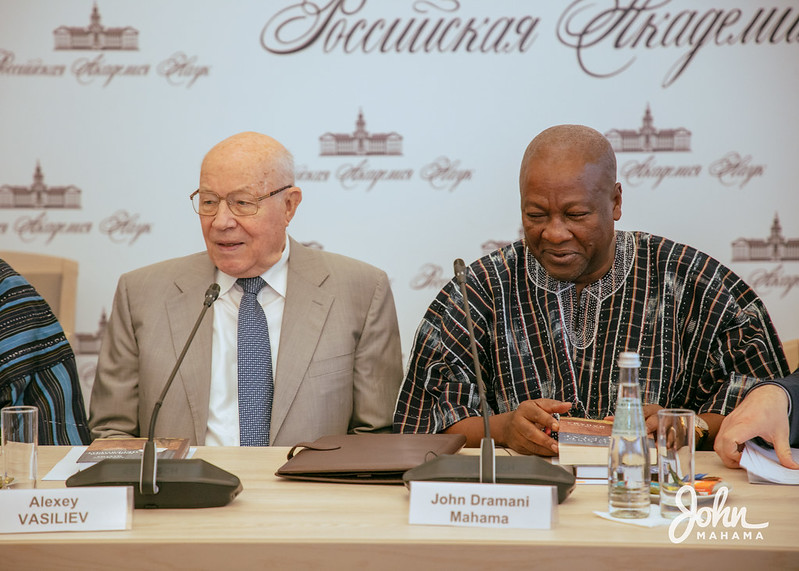
Speaking about the book published in July 2012, Mr Mahama said it is a memoir chronicling his upbringing as a young African boy as well as the history of Ghana and Africa during times of political and economic instability between the 1970s and 1990s. He mentioned that the book has also been translated into Portuguese.
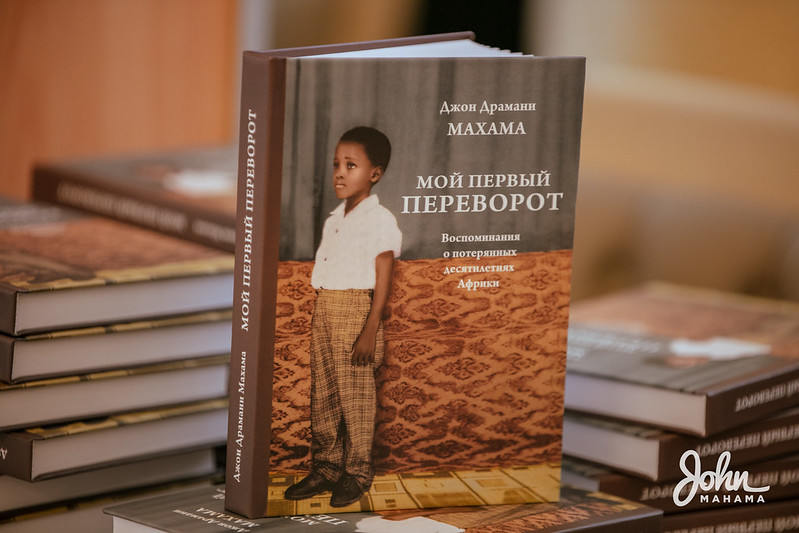
Mr Mahama highlighted a chapter of the book that he believed would interest the Russian audience the most, recalling his time as a student at the Institute of Social Sciences in Moscow during the era of Gorbachev and the Perestroika— the ‘restructuring’ of Russian society and economy.

He shared fond memories of his philosophy lecturer, Mr. Gudoshnik, who was initially unsure about teaching the orthodox philosophy of socialism as it was in the textbook provided. Mr. Gudoshnik, he noted, decided to have a more interactive approach to teaching, saying, “We’re going to learn from each other. I’ll tell you what’s in the textbook, and you tell me what you know and what you think about it.”

Mr. Mahama expressed gratitude to the Russian Academy of Sciences, Comrade Dmitriy Savelyev, a member of the Russian State Duma, the Russia-Ghana Parliamentary Friendship Association and his old friends and comrades who helped in translating the book and organising the launch event.
He also acknowledged his friend and editor of the book, Nana Ama Danquah, who encouraged him to share his stories in a book for the benefit of society.

The former Ghanaian president encouraged the audience to read the book to satisfy their curiosity and to discover the African story told in an easy-to-read and journalistic form.
Mr. Mahama expressed hope that the book would find a place in Russian academia for those interested in learning more about Africa.
Explore the world of impactful news with CitiNewsroom on WhatsApp!
Click on the link to join the Citi Newsroom channel for curated, meaningful stories tailored just for YOU: https://ift.tt/BWjG3Aw
No spams, just the stories that truly matter! #StayInformed #CitiNewsroom #CNRDigital
Google’s Now Translating SERPs Into More Languages - Search Engine Journal - Translation

Google updated their documentation to reflect that it added eight new languages to its translated results feature, broadening the reach of publishers to an increasingly global scale, with automatic translations to a site visitor’s native language.
Google Translated Results
Translated Results is a Google Search feature that will automatically translate the title link and meta description into the local language of a user, making a website published in one language available to a searcher in another language. If the searcher clicks on the link of a translated result the web page itself will also be automatically translated.
According to Google’s documentation for this feature:
“Google doesn’t host any translated pages. Opening a page through a translated result is no different than opening the original search result through Google Translate or using Chrome in-browser translation. This means that JavaScript on the page is usually supported, as well as embedded images and other page features.”
This feature benefits publishers because it makes their website available to a larger audience.
Search Feature Available In More Languages
Google’s documentation for this feature was updated to reflect that it is now available in eight more languages.
Users who speak the following languages will now have automatic access to a broader range of websites.
List Of Added Languages
- Arabic
- Gujarati
- Korean
- Persian
- Thai
- Turkish
- Urdu
- Vietnamese
Why Did It Take So Long?
It seems odd that Google didn’t already translate results into so many major languages like Turkish, Arabic or Korean. So I asked international SEO expert Christopher Shin (LinkedIn profile) about why it might have taken so long for Google to do this in the Korean language.
Christopher shared:
Google was always facing difficulties in the South Korean market as a search engine, and that has to do mainly with Naver and Kakao, formerly known as Daum.
But the whole paradigm shift to Google began when more and more students that went abroad to where Google is the dominant search engine came back to South Korea. When more and more students, travelers abroad etc., returned to Korea, they started to realize the strengths and weaknesses of the local search portals and the information capabilities these local portals provided. Laterally, more and more businesses in South Korea like Samsung, Hyundai etc., started to also shift marketing and sales to global markets, so the importance of Google as a tool for companies was also becoming more important with the domestic population.
Naver is still the dominant search portal, but not to retrieve answers to specific queries, rather for the purpose of shopping, reviews etc.
So I believe that market prioritization may be a big part as to the delayed introduction of Translated Google Search Results. And in terms of numbers, Korea is smaller with only roughly 52M nationwide and continues to decline due to poor birth rates.
Another big factor as I see it, has to do with the complexity of the Korean language which would make it more challenging to build out a translation tool that only replicates a simple English version. We use the modern Korean Hangeul but also the country uses Hanja, which are words from the Chinese origin. I used to have my team use Google Translate until all of them complained that Naver’s Papago does a better job, but with the introduction of ChatGPT, the competitiveness offered by Google was slim.”
Takeaway
It’s not an understatement to say that 2024 has not been a good year for publishers, from the introduction of AI Overviews to the 2024 Core Algorithm Update, and missing image thumbnails on recipe blogger sites, there hasn’t been much good news coming out of Google. But this news is different because it creates the opportunity for publisher content to be shown in even more languages than ever.
Read the updated documentation here:
Translated results in Google Search
Featured Image by Shutterstock/baranq
Wednesday, July 10, 2024
Translated Announces Imminent’s 2024 Research Report: “Symbiotic Connections” - Slator - Translation

The report explores the symbiosis between humans and machines, examining cognitive processes and language and highlighting technological advances driven by large language models and socio-technical system design challenges.
ROME, 7 July 2024 — Translated, a global leader in AI-powered localization solutions, is pleased to announce the publication of ‘Symbiotic Connections,’ the fourth annual research report from their research center, Imminent. The 2024 edition of the report delves into the symbiotic relationship between humans and machines, focusing on cognitive processes and language, and how machines can enhance human capabilities. This exploration encompasses localization activities, technological advances, and cognitive function studies, highlighting the design challenges and opportunities within socio-technical systems.
“Humans co-evolve with their technologies. Their vision of the consequences of their innovations is embedded in the quality of the outcome. The design of socio-technical systems is an announced but unexplored frontier that should appeal to all humans who are aware of the great challenges they face. Imminent’s 2024 Research Report is dedicated to them,” says Luca De Biase, Editorial Director at Imminent.
Insights are provided not only by selected authors but also by a vibrant community of innovation specialists in cross-cultural relations and translation. This community thrives through daily collaboration on Translated’s projects, including the 2023/24 Unconferences series, which spans three continents.
This year’s edition features in-depth coverage of large language models, from their origins to applications in translation and global innovations, by Translated’s tech evangelist Kirti Vashee. Eugenia Urrere, founder of Indigenius, presents a global overview of the current state of indigenous languages. Cosimo Accoto, a tech philosopher and MIT fellow offers an analysis of the transition towards socio-technical systems based on superhuman thinking. In addition, the latest research report includes a comprehensive report on the series of Unconferences that Imminent has organized worldwide over the past year.
Since its inception in 2021, Imminent has been dedicated to exploring, connecting, and sharing cutting-edge research on language and AI. The overwhelmingly positive response to our research reports has led us to reprint previous issues to meet the high demand. These reports have offered deep insights into various markets, highlighting the significant impact of language and cultural nuances on business expansion.
“We are approaching the singularity in translation faster than expected. We are seeing it right now. While this will be beneficial for everyone, we all feel the need to get a better understanding of what’s happening, on a technological and human level, and this Imminent report is a very useful guide to our future,” says Marco Trombetti, founder and CEO of Translated.
This week, Multilingual Magazine will distribute the 2024 Research Report to all its subscribers. You can request a copy of the magazine at imminent.translated.com.
About Translated
Translated is a leading language services provider and a pioneer in the use of artificial intelligence (AI) to assist professional translators. The company was founded in 1999 by linguist Isabelle Andrieu and computer scientist Marco Trombetti to allow everyone to understand and be understood in their own language. In pursuit of its mission, Translated invented commercial context-adaptive machine translation (MT) in 2017 with ModernMT, which was named a world-leading MT in the 2022 IDC MarketScape report. With ModernMT, Translated combines the sensitivity of over 300,000 vetted, native-speaking professional translators with the speed and capability of machines, making it possible to tackle localization projects that were once unimaginable. Today, Translated delivers fast, consistent, high-quality translations to more than 280,000 customers in 200 languages and over 40 subject areas.
Translated’s Press Contact
Silvio Gulizia
Head of Content
Mail: silvio@translated.com
Mob.: +39 393 1044785
Babel fish? We're getting there. Reg reviews the Timekettle X1 AI Interpreter Hub - The Register - Translation
Review One of the more useful applications of AI technology is translation and interpreting. The Timekettle X1 AI Interpreter hub attempts to move things forward with a pleasing industrial design.

Timekettle – the name comes from the Asimov novel The End of Eternity – has been in the translation game for a few years now, and the X1 represents a foray into a more business-like world with features to please corporate users and, alas, a price to match.
We'll start with the good. It's a well-designed device, weighing just under 200g. The 900 x 412 screen is bright and clear, although the hardware is a little chunkier than we'd like. It is portable enough at 130mm x 45mm x 30mm, although modern industrial designers would doubtless scoff at the thickness.
Timekettle told us that consideration was being given to a future version that is both lighter weight and more portable.
There is method to the madness, however. The battery that runs the show is a 3200mAh unit that Timekettle says will provide up to 168 hours of standby time or 12 hours of operation. The unit also has a drawer with two wireless earpieces, which is where the magic happens.

The X1 can be used as a normal, if expensive, portable translation device. Charge it using the USB-C cable provided, select the required function from the screen, push the big round button, and start to speak. The translator will then do its stuff in the same way that translators have worked since the first devices appeared in those catalogs shoved down the back of seats by US airlines in days of yore.
But the wireless earpieces are the true party trick of the X1. Pop one in an ear and give the other to the person you wish to converse with, select the languages, and chat away. We tried it with German, Greek, and Spanish, and the device coped admirably. Ours came with some covers because, let's face it, the ick factor is relatively high when it comes to using an earpiece. A pack of antibacterial wipes wouldn't go amiss.

The device has five translation modes. The first is One-on-One, which we used in the paragraph above. Timekettle describes it as "real-time conversation." We'd take issue with that since there is a noticeable delay while the translation happens, which worsens the more you speak. The device also suffers from the translation software occasionally getting confused by slang or colloquialisms.
That said, the conversation flows pretty well once a user becomes accustomed to it.
The Listen & Play mode is useful for catching up with presentations given in another language – we simply put the device in front of the speaker and listened to the translation through the earpieces. Ask & Go makes the X1 behave like a handheld translator. And then there are the two business-specific modes that require more than one X1.
Voice Call Mode is designed for one-on-one telephone or video calls and requires a device at each end. Multi-Person mode is used for a conference with up to 20 participants in five languages, although you'll obviously need multiple X1s to achieve this feat.
Indeed, the latter two modes will be of most interest to businesses spread across multiple geographical regions, while the former modes are more suited to the lone traveler.
In use
While the X1 will work offline, although working offline is only supported in the One-on-One and Listen & Play modes, it is much happier working online, which requires a Wi-Fi connection. Being an Android 10 device at heart, getting it connected to Wi-Fi wasn't too difficult – although the Frankfurt airport departure lounge defeated the Android browser – yet it was also a little surprising that it demanded we key in the Wi-Fi password, considering the speech recognition capabilities of the device.
Readers will be unsurprised to learn that the default translation is from Chinese to English, considering the product's origins.
The company has reassuring words for users concerned about privacy. A spokesperson told us, "We have 15 servers globally which can cover 200+ countries and regions; the data in Europe will only be sent to those servers located in Europe (Germany, France)."
"Also, the audio data is only used for translation only, no data will be stored."
The spokesperson went on: "Once the earbuds pick [up the] user's voice, it will send the audio data to the AWS cloud server, and we cooperate with top translation engines like Microsoft, Google, DeepL, etc. to do the translation, then send the translation result audio to the earbuds so [the] user can hear.
"Only the audio is transferred, and the data is only used for translation only; after translation is done, the data will be erased from the server permanently. We never store users' data. The translation result will only store on your device locally; you can trace them in 'Translation History'.
"Since it is only stored locally, if you delete them, it will be deleted permanently."

We can imagine some enterprises taking issue with a device that is effectively transcribing discussions, but in practice it is a handy feature to have.
Conclusion
Is the X1 AI Interpreter Hub any good? The answer is yes and no. Suppose you are a casual user needing to buy a beer from a bar where the staff speak a different language. In that case, the variety of free translation apps available on your phone will probably be sufficient, and you won't need to worry about dealing with the earpieces.
However, in a business setting – which is where the X1 is clearly being targeted – it works well. The One-on-One mode was impressive once users became accustomed to it. While still not as fluid as we'd like, it is an improvement on the current state of the art. Multi-person mode is where the device shone, although with companies such as Microsoft adding translation capabilities to their meeting products, enterprises will need to consider the value.
And this is where the cost of the X1 AI Interpreter Hub comes into play. Timekettle would like £554.11 ($699.99) for a single device, effectively pricing it out of reach for most consumers and giving cash-strapped enterprises pause for thought. That said, the efficiencies gained by users who have frequent international interactions could justify the expense, and features such as multi-person mode will prove useful for meetings that span multiple languages. ®
Tuesday, July 9, 2024
WhatsApp could soon get a Galaxy AI-powered Live Translate feature - Tom's Guide - Translation
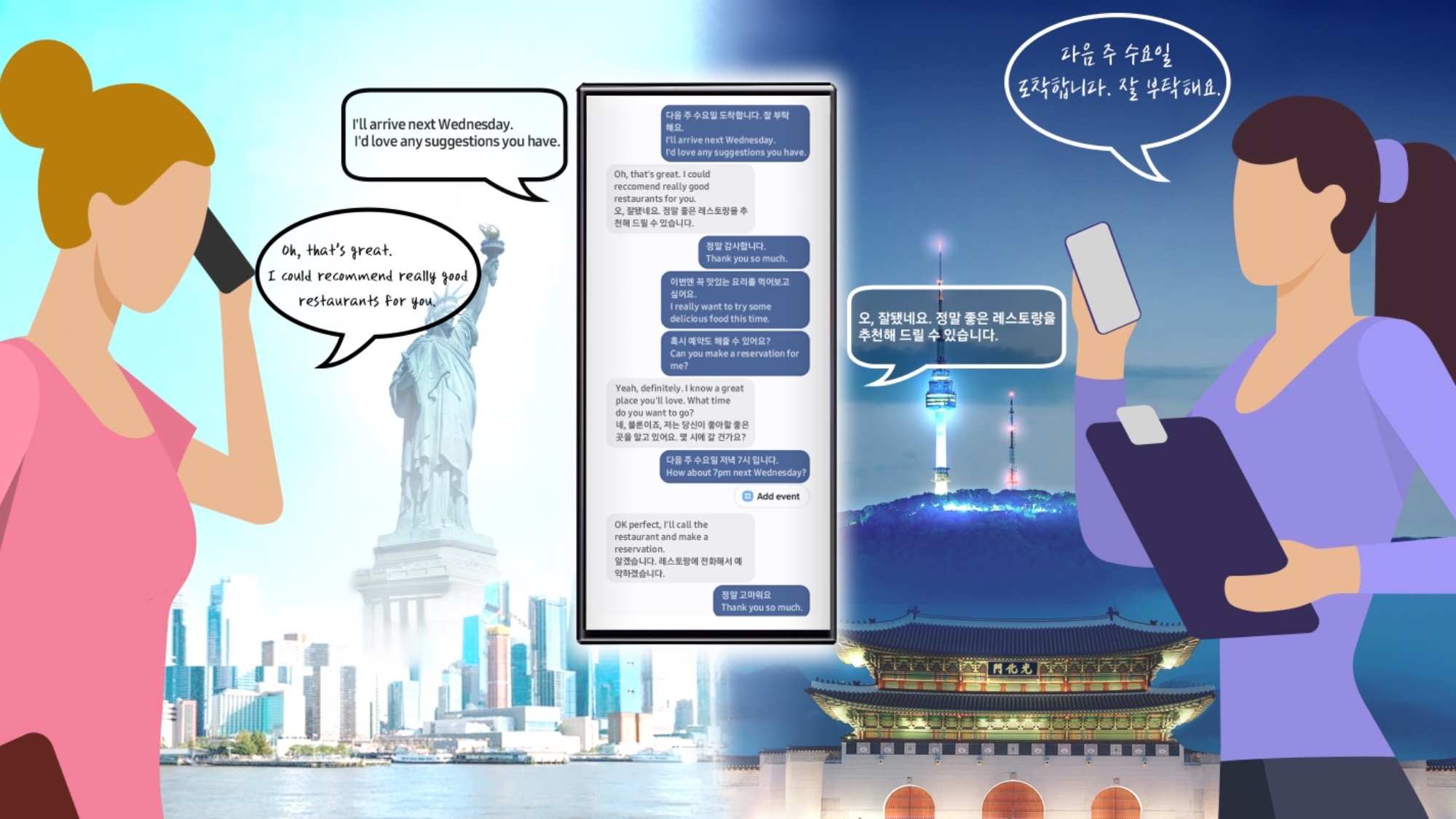
When Samsung launched its Galaxy S24 models last year, the company teased some of the exciting new AI features pegged to enhance smartphone capabilities. One of these impressive features was Live Translate, which offered users real-time translation between different languages. While the feature was hardwired for Samsung apps and devices, support for third-party apps has always been on the agenda, and it appears WhatsApp is first in line.
According to a tip as per @UniverseIce (via Neowin), WhatsApp integration is well on the way, but there's no anticipated timeframe for when the features will arrive on the messaging platform. Samsung has previously mentioned that other apps will also get Live Translate capabilities, but has not specified any apps in particular.
Galaxy AI will power WhatsApp real-time translationJuly 6, 2024
As per a report by SamMobile, Samsung hasn’t explicitly stated which third-party apps will be included in the rollout, however, it is expected that "all popular VoIP calling apps like Facebook Messenger, Google Meet, Telegram, Viber and WhatsApp" will be included in the integration.
In our Samsung Galaxy S24 Ultra review, we said that Live Translate is one of the device's more useful features as it allows it to become a hands-free translator during phone calls and text messages, and has support for 13 languages. The Translate features also include a standalone interpreter tool for instant audio translations.
We're not sure how the features would work exactly for WhatsApp or other third-party apps, as live translation is already integrated into Samsung's calls and texts. But, we can reasonably assume that the integration will extend to WhatsApp's audio calls and text messages.
Live Translate coming to other Galaxy products
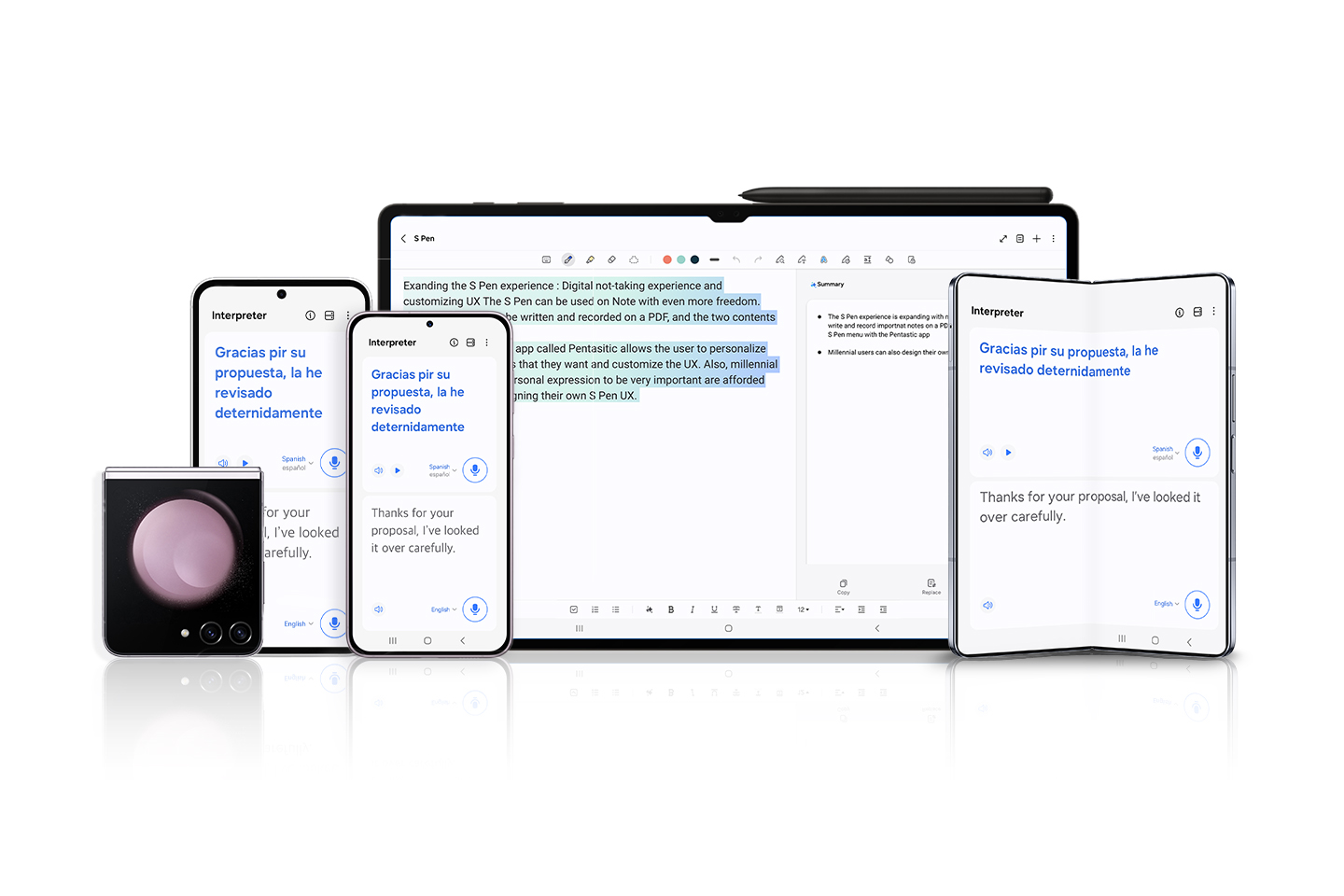
We previously reported back in February that these real-time translation features could be coming to the Galaxy Buds 2, Galaxy Buds 2 Pro and Galaxy Buds FE. At the time, reports suggested a firmware update would allow the Buds models to use Live Translate features once installed and paired with an S24 handset. However, there's been no confirmation since on whether the Buds have received these updates.
Meanwhile, Live Translate and other Galaxy AI features have rolled out into older Samsung models with the latest One UI 6.1 software update. These models include the S23 and S22 series, Galaxy Z Fold 4, Galaxy Z Flip 4 and Galaxy Tab S8 models.
That being said, we expect more Galaxy AI features to be announced later this week alongside new hardware, as the Samsung Unpacked event is scheduled for Wednesday 10 July EST/ Thursday 11 July AEST. As always, we will keep you updated with any changes or announcements that come our way, but for now, our fingers are crossed that more innovative features, like Live Translate, will be announced in future Samsung Galaxy devices.
Lucy Scotting is a digital content writer for Tom’s Guide in Australia, primarily covering NBN and internet-related news. Lucy started her career writing for HR and staffing industry publications, with articles covering emerging tech, business and finance. In her spare time, Lucy can be found watching sci-fi movies, working on her dystopian fiction novel or hanging out with her dog, Fletcher.
